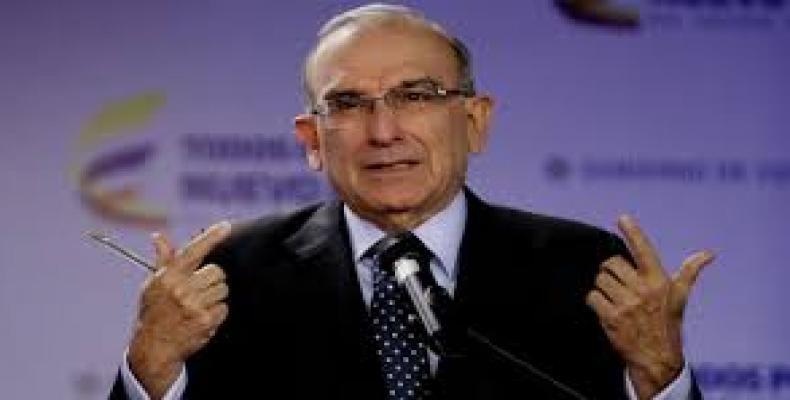Bogota, October 4 (RHC)-- Colombia's chief negotiator at the peace dialogues with the country's leftist rebels has offered his resignation, hours after Colombians narrowly voted down the peace deal in a non-binding plebiscite Sunday.
Humberto de la Calle, who has led the negotiation team for President Juan Manuel Santos, spoke with reporters in Bogota, praising President Juan Manuel Santos and saying that he took "full and exclusive responsibility" for errors committed at the negotiations.
It will now be up to Santos to decide if he accepts de la Calle's resignation, although the government's top negotiator said that he is willing to continue working wherever needed.
In Sunday's vote, the "No" won by a narrow margin, with 50.21 percent, or 6,431,376 votes, to 49.78 percent, or 6,377,482 votes for the "Yes" vote – a difference of some 66,000 votes. Voter turnout was very low at under 40 percent, with only 13 million of the 35 million eligible voters making it to the polls.
The surprising results — which were contrary to all exit polls that predicted the "Yes" vote winning easily — are showing that the areas most affected by the conflict have overwhelmingly voted "Yes" for peace. For example, in the heavily affected area of Choco – with 95 percent of the vote counted – 79 percent voted "Yes." The Caribbean provinces have also voted "Yes."
In the capital, Bogota, the "Yes" vote won by 56 percent to 44 percent for the "No" vote.
The plebiscite was non-binding and now the Colombian Congress can still elect to pass the laws necessary to comply with the accords, although the amnesty law was built into the plebiscite, and without its passage the agreement is basically null.
The FARC-EP had consistently called for a constituent assembly instead of a plebiscite, arguing that an assembly would be much more representative and would guarantee the participation of the most marginalized and affected peoples in Colombia and would go beyond a simple yes or no vote.
In light of the vote, the FARC-EP said in an official statement that it will continue to pursue peace, using its "word as a weapon of construction towards the future," and concluding that it is confident peace will prevail.
President Santos said he will abide by the vote but will not give up on peace, sending negotiators back to Havana to meet with their FARC-EP counterparts. And he reiterated that the bilateral cease-fire between the FARC-EP and the government will remain in effect.
Colombians went to the polls to vote on the approval or rejection of the peace agreement reached between the government of Santos and the FARC-EP guerrillas after nearly 4 years of negotiations.
The question posed to the population was: “Do you support the final accord for the end of the conflict and the construction of stable and lasting peace?”
The final text of the peace deal was signed on September 26th by President Santos and FARC-EP leader Timoleon Jimenez, with numerous regional leaders and heads of state in attendance. The historic act is now clouded by the outcome of the plebiscite.
Top Colombian Government Peace Negotiator De La Calle Offers Resignation After Failed Plebiscite Vote

Related Articles
Commentaries
MAKE A COMMENT
All fields requiredMore Views
- Trump reportedly orders military to draw up plans to seize Panama Canal
- Ecuador's Electoral Debate: Luisa González urges Noboa not to lie to the people and keep his campaign promises
- Bolivia demands sovereign access to the sea and begins a new stage in relationship with Chile
- Thousands of protesters in Spain call for a boycott of Israel and an end to genocidal attacks on Gaza
- Cuba to play women's soccer friendlies against Peru

